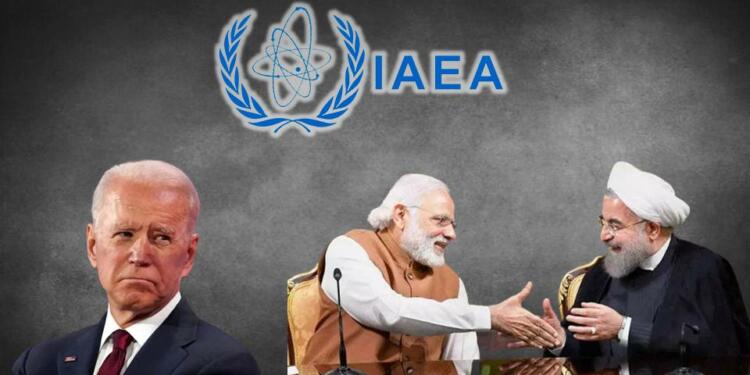In the churning debate of alignment, regrouping, and alliance in the fast-changing world. The Chinese virus & Ukraine war has induced two simultaneous problems in the world. On one hand, the world economy is slowing down and on the other; the global world order is in danger. In this changing geopolitical situation, India, the world’s largest democracy with about 17.7% of the world’s total population will decide the global balance of power. Having this much weight in the world, India is also playing smart considering its people’s best interest.
West’s stretching on Iran’s nuclear program
Following the recently released report of the International Atomic Energy Agency (IAEA), India abstained from the United States, the United Kingdom, France and Germany backed resolution “condemning Iran for its failure to provide an explanation on technicality credible evidence about the detection of nuclear trace at three undisclosed locations”. In the voting-related to condemning Iran, 30 out of 35 members of the IAEA’s board voted in which China and Russia rejected the motion, while India, Pakistan, and Libya abstained from the resolution.
Saeed Khatibzadeh, the official spokesperson of Iran’s foreign ministry terming the resolution ill-advised said that “US-E3 put their shortsighted agenda ahead of credibility of International Atomic Energy Agency (IAEA) by pushing a miscalculated & ill-advised Res. against a country w/ the world’s most transparent peaceful nuclear program. The initiators are responsible for the consequences. Iran’s response is firm and proportionate”.
US-E3 put their shortsighted agenda ahead of IAEA's credibility by pushing a miscalculated & ill-advised Res. against a country w/ the world's most transparent peaceful nuclear program.
The initiators are responsible for the consequences. Iran's response is firm & proportionate.
— Saeed Khatibzadeh | سعید خطیبزاده (@SKhatibzadeh) June 8, 2022
The resolution comes in the backdrop of the recently released IAEA’s assessment of Iran’s nuclear program in which the report claimed that there is a “lack of progress in getting Iranian authorities to remove long-standing ambiguities over the presence of nuclear particles at three undeclared side and possible ministry dimension of Iran’s nuclear activities”.
Read More: India forces Iran to take down arbitrary commentary on Nupur Sharma from their government website
India’s Smart Diplomacy
Already China and Russia are aligning against the west on every multilateral platform. The Ukraine war has further pushed the bonhomie of the two communist countries. Now, in this power balancing, regrouping, and alignment, India’s position will decide the tilted balance of power.
Abstaining from voting against Iran on the International Atomic Energy Agency (IAEA) resolution withstanding the western pressure, speaks volumes about the smart diplomacy of India. On one hand, India is making a strong security and economic pact with the ‘west’ in the Indo-Pacific region, and on the other, taking the opposite stance in the western led multilateral organization like IMF (International Monetary Fund), WTO (World Trade Organization) or International Atomic Energy Agency (IAEA).
Vijaya Gokhale, former foreign secretary speaking on the 2019 Raisina Dialogue about the changing stances on the non-alignment of India had said that “India has moved on from its non-aligned past. India is today an aligned state – but based on issues”.
Vijay Gokhale: India has moved on from its non-aligned past. India is today an aligned state — but based on issues.#Raisina2019
— Raisina Dialogue (@raisinadialogue) January 10, 2019
The two-line statement of the former foreign secretary defines the contemporary smart diplomacy played by India in the churning world order. Smartness means intelligence in taking decisions based on the best interest of India and its people. Neither on the rhetoric of idealism nor on corrupted ideological alignment, the diplomacy is played on pure realism of India’s best interest.
Read More: India remains immune to US Sanctions over Iran Oil import
When India aligned with the West in the Indo-Pacific in the form of the Quad security dialogue or Indo-pacific Economic Framework, the alliances were based on calculated security & economic interest of the country. Similarly, abstaining against Iran in International Atomic Energy Agency (IAEA) or refusing to condemn Russia for its ‘special operations’ in Ukraine reflected the bold and pragmatic decision-making power of India that India is now ready to save its interest. So, abstaining from Iran reflects India’s growing interest in Iranian crude oil.
It is pertinent to mention that owing to the US sanctions against Iran, India had decided to stop all oil imports from Iran in 2019. Iran’s oil trade with India is considered to be the best in terms of economic interest as our oil refineries are adept at Iranian sweet oil, Iranian trading acceptance in both rupee and goods, and very low transportation cost owing to the short distance of its Bandar Abbas and Chabahar port.
So, India’s stance on International Atomic Energy Agency (IAEA) reflects the churning debate in the foreign ministry to resume the crude oil trade with Iran. Oil prices rise due to uncertainty and global supply chain disruption is affecting the budget of oil-importing countries. The manufactured price rise in the oil market is forcing countries like India to find alternate and cheap oil from the world and resuming oil import from Iran could be the best option available for India.
Support TFI:
Support us to strengthen the ‘Right’ ideology of cultural nationalism by purchasing best quality garments from TFI-STORE.COM

























